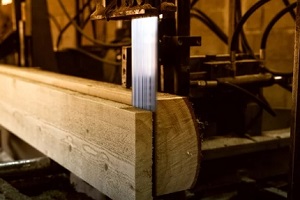
The forestry industry is dangerous, and within it, one of the most hazardous places to work is in a sawmill. Studies indicate that sawmills experience a higher rate of injury than many other types of forest work because the job involves handling lumber earlier in its processing journey, when it is more unpredictable, heavier, and more cumbersome.
Approximately 40% of injuries that occur within a sawmill are a result of manually handling oversized materials such as logs and lumber. Of all injuries sustained by workers in sawmills, only 1% were classified as unavoidable; the rest could be traced back to company liability.
Knowing this, sawmills and their adjacent business operations must maintain a comprehensive spectrum of insurance coverage to avoid financial consequences for the many challenges faced by forestry work. The following is an overview of sawmill insurance, including what it covers, what it does not, and who should acquire a sawmill insurance policy.
What Does Sawmill Insurance Cover?
Sawmills come in multiple shapes and sizes, from fully structured, automated mills to smaller, portable machines. Regardless of which type your company utilizes, sawmill insurance will cover the most pressing key areas, including:
- Liability – Commercial liability protects visitors, customers, and other third parties while they are near your mill. If they are injured as a result of your sawmill operations, commercial liability insurance will pay for their medical costs or the legal action they take against the business. Product liability often comes bundled, which safeguards the company against a lawsuit should a customer sustain an injury or property damage due to faulty or defective wood products that were processed at the sawmill. Some sawmill insurance will also come with pollution insurance, for if the machinery creates a hazard to the natural environment, such as by leaking oil.
- Property – Sawmills rely on the heavy machinery on the premises to do the hard work of processing lumber. Splitters, saws, and conveyor belts can all suffer from unforeseen events like weather damage, fires, vandalism, theft, and more. Your company will be covered when trying to repair or replace these critical devices if you carry property insurance. Related policies that may come bundled as part of overarching sawmill coverage also include equipment breakdown coverage, business interruption insurance, and inland marine insurance, which protects your products while they are in transit.
- Workers’ compensation – Few types of insurance are as important to a sawmill as workers’ compensation coverage. Because sawmills are so dangerous, businesses should invest in robust workers’ comp protection to ensure employees have the financial protection they need to recover successfully after an accident. Workers’ compensation can pay for medical costs, time off to recover, physical therapy, and many other health-related needs for employees who are injured on the job.
These are just a few of the many types of coverage that sawmill insurance can provide. An insurer with industry experience can offer comprehensive protection for your company’s greatest risks.
Who Should Acquire a Sawmill Insurance Policy?
Sawmill insurance is not typically limited only to locations with an active mill. Many wood product operations can qualify for sawmill insurance, such as lumber treatment and drying facilities, furniture manufacturers, retail lumber yards, pallet manufacturers, locations that create hardwood flooring, and even architectural mills. Speak with an insurance agent to see if this type of coverage is right for your niche of the lumber business.
What May Not Be Covered

Sawmills face unique risks, and not all of them may be covered by a standard sawmill policy. For instance, if you operate a portable mill, you may benefit from business insurance in order to protect the tow vehicle while it is moving the mill to another location.
Sawmills that offer side work as tree fellers will need separate coverage that protects them during that activity. It is wise to carefully consider equipment breakdown and physical damage coverage that applies to the specific machinery used, depending on the type of sawmill that your business operates.
This ensures that the damage sustained by any equipment is properly covered; otherwise, many types of commercially available insurance will exclude sawmills due to their high risk.
Get Comprehensive Sawmill Coverage from the Pros
Whether you operate a portable sawmill as a side business or a full-fledged industrial enterprise, it is critical to insure your company across multiple vectors due to the high risk associated with sawmill operations.
The experts at Burton & Company specialize in sawmill and other forestry insurance coverage and can help you create the ideal mixture of protections within your budgetary constraints. Contact Burton & Company to discuss your options and determine the areas that pose the greatest risk.
Burton & Company’s team of experienced insurance advisors will analyze your risks and offer you a tailored insurance plan that aligns with your requirements and budget. Contact us today to discover how we can secure your valuable assets and provide you with peace of mind, so you can focus on what truly matters.

